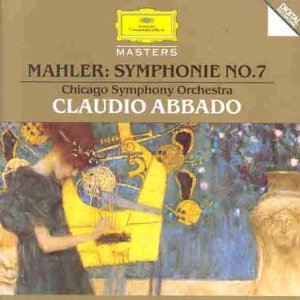Mahler Symphony No 7
View record and artist detailsRecord and Artist Details
Composer or Director: Gustav Mahler
Genre:
Orchestral
Label: DG
Magazine Review Date: 3/1985
Media Format: CD or Download
Media Runtime: 79
Mastering:
DDD
Catalogue Number: 413 773-2GH2

Tracks:
| Composition | Artist Credit |
|---|---|
| Symphony No. 7 |
Gustav Mahler, Composer
Chicago Symphony Orchestra Claudio Abbado, Conductor Gustav Mahler, Composer |
Author: Richard Osborne
Abbado' s view of Mahler's Seventh Symphony, like Haitink's on Philips, is judicious and clear-sighted. The playing of the Chicago Symphony, like that of the Concertgebouw, is exceptionally refined, free of all inadvertent exaggeration and histrionic display. Both conductors, in collaboration with their engineers, favour natural sound perspectives, a mid-stalls view. Aided by a clean acoustic and poised, clearly-projected solo playing in the orchestra, the most intimate details of Mahler's huge score seem effortlessly to carry.
The difficult outer movements are neither urged forward in the Kubelik style (at mid-price on DG) nor broadened in the highly-tendentious manner of Klemperer on CfP. As ever, Abbado is the unpretentious, keen-eared elucidator. So conscientious is he that there are moments in the first movement when it's possible to think the score over-annotated by the composer. Yet it is a measure of Abbado's general skilfulness that the somewhat episodic structure is held in a reasonably clean focus. The central meditation is unusually fine in this performance, notable for the concentration and fine-grained sensibility of the Chicago playing.
Nachtmusik II is also played without exaggeration, Abbado allowing the orchestra to register Mahler's Andante amoroso directly, eloquently. In Nachtmusik I he is strikingly relaxed, sehr gemachlich; yet he conducts as quick a performance of the eerie central Scherzo as I recall hearing on record. (I suspect that Scherchen's distinguished old Vienna State Opera Orchestra recording, on Nixa mono WLP6211, 7/54—nla, was as quick, but I don't have it to hand for comparison.) I must say I like the movement played with a modicum of drive. Unfortunately, Mahler's instructions are ambiguous and could be taken equally as chapter and verse for Haitink's most recent, and to my ears rather flaccid, performance. This is a movement in which Kubelik on DG Privilege is superb; as, indeed, he is throughout the symphony.
You may conclude from all this that Abbado's performance is almost too respectable. A symphony as bizarre as this occasionally is (Deryck Cooke once dubbed it Mahler's ''mad, mad, mad, mad symphony'') could be said to require a touch of hype, Bernstein-style (CBS SBRG72427/8, 6/66—nla). Abbado's clear appraisal of the score should, none the less, win friends for the work, not least because of the Chicago orchestra's distinguished and distinctive realization of Mahler's difficult and, at times, technically innovative writing.'
The difficult outer movements are neither urged forward in the Kubelik style (at mid-price on DG) nor broadened in the highly-tendentious manner of Klemperer on CfP. As ever, Abbado is the unpretentious, keen-eared elucidator. So conscientious is he that there are moments in the first movement when it's possible to think the score over-annotated by the composer. Yet it is a measure of Abbado's general skilfulness that the somewhat episodic structure is held in a reasonably clean focus. The central meditation is unusually fine in this performance, notable for the concentration and fine-grained sensibility of the Chicago playing.
Nachtmusik II is also played without exaggeration, Abbado allowing the orchestra to register Mahler's Andante amoroso directly, eloquently. In Nachtmusik I he is strikingly relaxed, sehr gemachlich; yet he conducts as quick a performance of the eerie central Scherzo as I recall hearing on record. (I suspect that Scherchen's distinguished old Vienna State Opera Orchestra recording, on Nixa mono WLP6211, 7/54—nla, was as quick, but I don't have it to hand for comparison.) I must say I like the movement played with a modicum of drive. Unfortunately, Mahler's instructions are ambiguous and could be taken equally as chapter and verse for Haitink's most recent, and to my ears rather flaccid, performance. This is a movement in which Kubelik on DG Privilege is superb; as, indeed, he is throughout the symphony.
You may conclude from all this that Abbado's performance is almost too respectable. A symphony as bizarre as this occasionally is (Deryck Cooke once dubbed it Mahler's ''mad, mad, mad, mad symphony'') could be said to require a touch of hype, Bernstein-style (CBS SBRG72427/8, 6/66—nla). Abbado's clear appraisal of the score should, none the less, win friends for the work, not least because of the Chicago orchestra's distinguished and distinctive realization of Mahler's difficult and, at times, technically innovative writing.'
Discover the world's largest classical music catalogue with Presto Music.

Gramophone Digital Club
- Digital Edition
- Digital Archive
- Reviews Database
- Full website access
From £8.75 / month
Subscribe
Gramophone Full Club
- Print Edition
- Digital Edition
- Digital Archive
- Reviews Database
- Full website access
From £11.00 / month
Subscribe
If you are a library, university or other organisation that would be interested in an institutional subscription to Gramophone please click here for further information.




